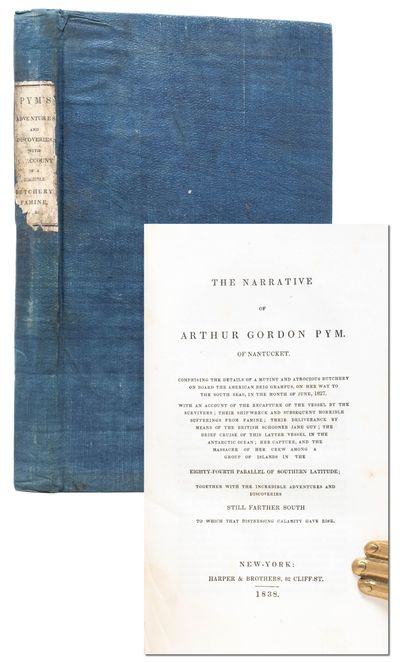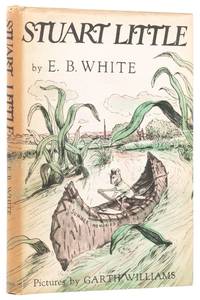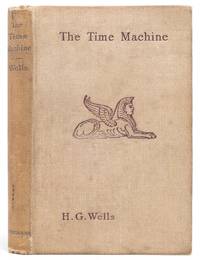first edition
1838 · New York
by Poe, Edgar Allan
New York: Harper & Brothers, 1838. First edition. Very Good +. Publisher's blue cloth retaining original paper spine label. Twelvemo. 201, [1, blank], 14 [publisher's catalogue] pp. Collating complete, retaining the two-page preliminary catalogue (dated May 1838), the terminal publisher's catalogue, and the flyleaves. With leaf F2 (p. 65) missigned "G2," as called for in BAL. Some bubbling and a bit of dampstaining to cloth. Spine label a bit chipped at lower corner. Remarkably clean throughout aside from some dampstaining to first and last few leaves. Tear to upper flyleaf neatly repaired with a thin strip of archival tape. Housed in a custom blue cloth slipcase with chemise. A Very Good+ copy, bright and attractive, in the publisher's cloth.
The Narrative of Arthur Gordon Pym is Poe’s only novel and an underappreciated classic. The novel follows the dark adventures of a stowaway on board a New England whaling ship. Poe was drawn to the idea of writing a longer work because of the difficulty he was having sustaining a career with his short stories. Although Pym contains Poe’s trademark mastery of the uncanny, he was also inspired by a number of contemporary travel accounts of the South Seas and areas near the Antarctic.
The novel’s reception was tepid, but it would later be recognized as a hidden masterpiece that exerted a strong influence on both American literature and the literature of the fantastic. Pym is thought to have helped inspired Melville’s Moby Dick – the works share some strong familiarities of theme and structure – as well as the author Jules Verne, who even wrote his own sequel to the work. In fact, the novel gained a great deal of respect abroad before American critics re-evaluated it. Baudelaire would translate it and Borges called it “Poe’s greatest work.” Lovecraft too was an admirer, and used many of its elements in his own story, "At The Mountains of Madness."
BAL 16128. Wright I, 2052. Very Good +. (Inventory #: 7321)
The Narrative of Arthur Gordon Pym is Poe’s only novel and an underappreciated classic. The novel follows the dark adventures of a stowaway on board a New England whaling ship. Poe was drawn to the idea of writing a longer work because of the difficulty he was having sustaining a career with his short stories. Although Pym contains Poe’s trademark mastery of the uncanny, he was also inspired by a number of contemporary travel accounts of the South Seas and areas near the Antarctic.
The novel’s reception was tepid, but it would later be recognized as a hidden masterpiece that exerted a strong influence on both American literature and the literature of the fantastic. Pym is thought to have helped inspired Melville’s Moby Dick – the works share some strong familiarities of theme and structure – as well as the author Jules Verne, who even wrote his own sequel to the work. In fact, the novel gained a great deal of respect abroad before American critics re-evaluated it. Baudelaire would translate it and Borges called it “Poe’s greatest work.” Lovecraft too was an admirer, and used many of its elements in his own story, "At The Mountains of Madness."
BAL 16128. Wright I, 2052. Very Good +. (Inventory #: 7321)













